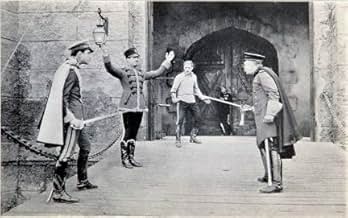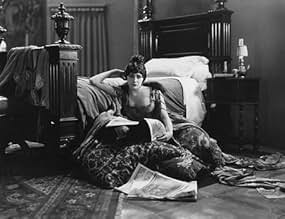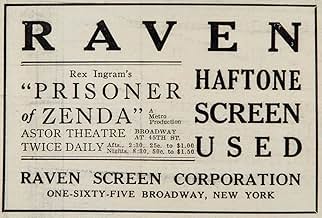Ajouter une intrigue dans votre langueWhen the king is drugged and abducted by his ambitious brother, a lookalike relative must take his place to keep the evil sibling off the throne.When the king is drugged and abducted by his ambitious brother, a lookalike relative must take his place to keep the evil sibling off the throne.When the king is drugged and abducted by his ambitious brother, a lookalike relative must take his place to keep the evil sibling off the throne.
- Réalisation
- Scénario
- Casting principal
- Récompenses
- 1 victoire au total
Ramon Novarro
- Rupert of Hentzau
- (as Ramon Samaniegos)
Fairfax Burger
- Bersonin
- (as Fairfax Burgher)
S.E. Jennings
- De Gautet
- (as Al Jennings)
Ted Billings
- Train Passenger Eating Banana
- (non crédité)
Carrie Daumery
- Lady-in-Waiting
- (non crédité)
Bynunsky Hyman
- Coronation Parade Spectator
- (non crédité)
Eric Mayne
- Lord Burlesdon - Rudolf's Brother
- (non crédité)
Lon Poff
- Archbishop
- (non crédité)
Avis à la une
English traveler and sportsman Lewis Stone (as Rudolf Rassendyll) decides to attend the coronation of distant relative "Rudolf V." of Ruritania (also Lewis Stone, in a dual role), after the recent death of the foreign land's King. But proposed King Stone has a wicked half-brother, who covets the title. Receiving most of his help from charismatic Ramon Novarro (as Rupert of Hentzau), treacherous brother Stuart Holmes (as Grand Duke Michael) plots to poison Mr. Stone and take his place on the throne. But, due to the royal Rudolf's fondness for alcohol, a switch is made. One who senses something rotten in Ruritania is beautiful Alice Terry (as Princess Flavia), who is expected to marry one, but falls in love with another...
"Towards the end of the day, when the soul is weary and the heart longs for its beloved"...
Anthony Hope's classic adventure story gets the MGM treatment, even though the studio mostly called "Metro" by insiders was only M-G- (no Mayer, yet) at the time. Metro's mega-hit "The Four Horsemen of the Apocalypse" (1921) director Rex Ingram and the principle players gathered here stuck with the company; helping set the standard for MGM productions, Metro/MGM competed successfully with older studios. This film advanced careers, most notably helping propel Mr. Novarro to "superstar" status. There are also fine impressions made by veteran Robert Edeson (as Colonel Sapt), bewitching Barbara La Marr (as Antoinette de Mauban) and debuting Malcolm McGregor (as Fritz von Tarlenheim)...
Notable re-makes in 1937 (all talking, with Ronald Colman) and 1952 (in color, with Stewart Granger) are worth seeking out in a "twofer" package from Warner/Turner. They should have added this 1922 version. It's still entertaining, due to swaggering action, good production values and captivating performances. This non-speaking "The Prisoner of Zenda" was the standard silent film era version. It was the #4 "Best Picture" of 1922 according to the annual "Film Daily" poll of critics. Rex Ingram, Lewis Stone, Alice Terry and Ramon Novarro received director and acting accolades. Stone, at his silent best here, essays a small part in the 1952 version; it was one of the last roles for the perennial Metro-contracted actor.
******** The Prisoner of Zenda (7/31/22) Rex Ingram ~ Lewis Stone, Alice Terry, Ramon Novarro, Malcolm McGregor
"Towards the end of the day, when the soul is weary and the heart longs for its beloved"...
Anthony Hope's classic adventure story gets the MGM treatment, even though the studio mostly called "Metro" by insiders was only M-G- (no Mayer, yet) at the time. Metro's mega-hit "The Four Horsemen of the Apocalypse" (1921) director Rex Ingram and the principle players gathered here stuck with the company; helping set the standard for MGM productions, Metro/MGM competed successfully with older studios. This film advanced careers, most notably helping propel Mr. Novarro to "superstar" status. There are also fine impressions made by veteran Robert Edeson (as Colonel Sapt), bewitching Barbara La Marr (as Antoinette de Mauban) and debuting Malcolm McGregor (as Fritz von Tarlenheim)...
Notable re-makes in 1937 (all talking, with Ronald Colman) and 1952 (in color, with Stewart Granger) are worth seeking out in a "twofer" package from Warner/Turner. They should have added this 1922 version. It's still entertaining, due to swaggering action, good production values and captivating performances. This non-speaking "The Prisoner of Zenda" was the standard silent film era version. It was the #4 "Best Picture" of 1922 according to the annual "Film Daily" poll of critics. Rex Ingram, Lewis Stone, Alice Terry and Ramon Novarro received director and acting accolades. Stone, at his silent best here, essays a small part in the 1952 version; it was one of the last roles for the perennial Metro-contracted actor.
******** The Prisoner of Zenda (7/31/22) Rex Ingram ~ Lewis Stone, Alice Terry, Ramon Novarro, Malcolm McGregor
As with "Scaramouche", I found this film rather stodgy, with a lacklustre score. Lewis Stone is too old in his dual role and Alice Terry lacked any real charm. This picture belongs to its supporting cast- Barbara LaMarr ("too beautiful for her own good") as Antoinette de Mauban, Colonel Zapt, Captain von Tarlenheim and,of course, Rupert of Hentzau, played with relish and humour by Ramon Novarro. I think I prefer him in this role to any other I have seen him portray; perhaps his popularity with the female audience meant he became stuck in the part of gentle romancer (long after he had become too mature for this) rather than developing his abilities as an actor.
I've seen both Rex Ingram's "Scaramouche" and "The Prisoner of Zenda" and by far "Scaramouche" the more entertaining film. This film though, was very fascinating. Lewis Stone acquits himself well as the hero/drukand king and swordfights quite well. Alice Terry made a very beautiful princess. Ramon Novarro played the monocled villain, somewhat unintentionally funny. Barbara La Marr, the closeups of her face, wow! Seeing Valentino's "cousins" from "The Four Horseman of the Acapolyse" in supporting roles was really cool.
However, the Colman/Fairbanks Jr. version is far superior.
However, the Colman/Fairbanks Jr. version is far superior.
"The Prisoner of Zenda" has been filmed about a dozen times...more of less. It's a VERY familiar story to anyone who loves old films. When I heard about this 1922 version coming on Turner Classic Movies, I at first thought it was the original one, though it turns out there was an even earlier version in 1913! Regardless, I was thrilled to finally see a silent version of a story I have long loved. So is this one as wonderful at the 1937 Ronald Colman version? Well, not exactly--but it sure was close.
Another surprise about this one is that is starred Lewis Stone--a guy I'd hardly think of as an action hero! This is the bald Judge Hardy...playing a handsome king! Looking at Stone's hair in the film, I assume he was wearing a wig, as he had A LOT of hair! But he was also quite good in the dual roles of King Rupert as well as his English cousin. Oddly, however, while Stone clearly is THE leading man, Ramon Navarro got top billing--which makes little sense as he's a relatively minor character. No, this is definitely Stone's film.
As far as the plot goes, it's pretty much the familiar story. The new king, Rudolf, is about to be crowned leader of Ruritania. However, his evil but popular brother, Michael, has plans of usurping the throne. First, he drugs Rudolf so he cannot attend the coronation. BUT, coincidentally, a distant cousin is at hand and poses as the king. However, this won't deter Michael, as he's discovered the real king and has taken him prisoner. So, you KNOW another attempt will soon be made on the pretend king's life. Can the evil Michael and his nasty henchmen be defeated? This is a lovingly made silent--with terrific sets and wonderful acting. I particularly loved the king's beloved #1 man--he had such wonderful and soulful eyes. And something unique to the film I really liked--the deadly river and how it plays into the film. Overall, a great silent--and a film that only barely was eclipsed by the great 1937 version (this film is just perfect).
Note: After the FIRST guy gets pulled over the deadly falls, the print's quality degrades VERY quickly. It is very fuzzy and could really use additional restoration.
Another surprise about this one is that is starred Lewis Stone--a guy I'd hardly think of as an action hero! This is the bald Judge Hardy...playing a handsome king! Looking at Stone's hair in the film, I assume he was wearing a wig, as he had A LOT of hair! But he was also quite good in the dual roles of King Rupert as well as his English cousin. Oddly, however, while Stone clearly is THE leading man, Ramon Navarro got top billing--which makes little sense as he's a relatively minor character. No, this is definitely Stone's film.
As far as the plot goes, it's pretty much the familiar story. The new king, Rudolf, is about to be crowned leader of Ruritania. However, his evil but popular brother, Michael, has plans of usurping the throne. First, he drugs Rudolf so he cannot attend the coronation. BUT, coincidentally, a distant cousin is at hand and poses as the king. However, this won't deter Michael, as he's discovered the real king and has taken him prisoner. So, you KNOW another attempt will soon be made on the pretend king's life. Can the evil Michael and his nasty henchmen be defeated? This is a lovingly made silent--with terrific sets and wonderful acting. I particularly loved the king's beloved #1 man--he had such wonderful and soulful eyes. And something unique to the film I really liked--the deadly river and how it plays into the film. Overall, a great silent--and a film that only barely was eclipsed by the great 1937 version (this film is just perfect).
Note: After the FIRST guy gets pulled over the deadly falls, the print's quality degrades VERY quickly. It is very fuzzy and could really use additional restoration.
Rudolf V, the King of Ruritania, has been kidnapped by Black Michael, his evil half-brother, and locked in the dungeon of the fortress of Zenda on the eve of his coronation. By a wild twist of fate, it falls upon a look alike distant cousin, the Englishman Rassendyll, to impersonate the king and effect his rescue before either one or both of them are killed by Black Michael or his henchman, Rupert of Hentzau. With two beautiful women complicating matters, and danger lurking at every turn, how can THE PRISONER OF ZENDA possibly be saved?
It is unfortunate that this fine silent film is completely overshadowed by its 1937 talkie remake starring Ronald Colman. It is also unfair. Silent films & talkies are two different art forms and should not be put into competition against each other. Each art form is perfect in its own way. And so it is with the 1922 PRISONER OF ZENDA. Excitingly produced, with excellent production values & good acting, this movie stands on its own merits and on its own feet.
Those familiar with Lewis Stone only as a fine character actor during his talkie career at MGM may be surprised to see him here as a romantic lead, and in a swashbuckler no less. But he is very good in his dual roles of Rudolf & Rassendyll. Strangely, at times he closely resembles Colman, but this is a coincidence no one could anticipate.
This was also the breakout picture for Ramon Novarro. Born to a large wealthy family in Mexico, he had arrived in California as a 15-year old looking to become a singer. That led him into dancing & finally to acting and the movies. Working incredibly hard for years, and largely supporting his family (driven North by Revolution) he finally caught the eye of director Rex Ingram. In ZENDA, the 22-year old Novarro plays rascally Rupert, who, with his little beard & moustache & face wreathed in constant cigarette smoke, looks quite sardonic. He does very well with the unsympathetic character. Playing a mid-European, Novarro begins a career which would have him acting every sort of ethnic role, from Hebrew, to Polynesian, to Chinese.
The rest of the cast all lend able support: Stuart Holmes as the wicked Black Michael; Alice Terry as the beautiful Princess Flavia; Barbara La Marr as the lovely Antoinette de Mauban, desperately in love with Michael; and Robert Edeson & Malcolm McGregor as two staunchly loyal officers of the king. Little comedian Snitz Edwards has a small role as a funny butler.
It is unfortunate that this fine silent film is completely overshadowed by its 1937 talkie remake starring Ronald Colman. It is also unfair. Silent films & talkies are two different art forms and should not be put into competition against each other. Each art form is perfect in its own way. And so it is with the 1922 PRISONER OF ZENDA. Excitingly produced, with excellent production values & good acting, this movie stands on its own merits and on its own feet.
Those familiar with Lewis Stone only as a fine character actor during his talkie career at MGM may be surprised to see him here as a romantic lead, and in a swashbuckler no less. But he is very good in his dual roles of Rudolf & Rassendyll. Strangely, at times he closely resembles Colman, but this is a coincidence no one could anticipate.
This was also the breakout picture for Ramon Novarro. Born to a large wealthy family in Mexico, he had arrived in California as a 15-year old looking to become a singer. That led him into dancing & finally to acting and the movies. Working incredibly hard for years, and largely supporting his family (driven North by Revolution) he finally caught the eye of director Rex Ingram. In ZENDA, the 22-year old Novarro plays rascally Rupert, who, with his little beard & moustache & face wreathed in constant cigarette smoke, looks quite sardonic. He does very well with the unsympathetic character. Playing a mid-European, Novarro begins a career which would have him acting every sort of ethnic role, from Hebrew, to Polynesian, to Chinese.
The rest of the cast all lend able support: Stuart Holmes as the wicked Black Michael; Alice Terry as the beautiful Princess Flavia; Barbara La Marr as the lovely Antoinette de Mauban, desperately in love with Michael; and Robert Edeson & Malcolm McGregor as two staunchly loyal officers of the king. Little comedian Snitz Edwards has a small role as a funny butler.
Le saviez-vous
- AnecdotesA few days before shooting was to start, director Rex Ingram realized that Metro had forgotten to order costumes for Lewis Stone. The desperate director frantically phoned Stone and asked if he still had the costumes from the stage version. Luckily the actor had them stored in his attic.
- GaffesDuring the climactic fight scene, a stool is kicked over twice.
- Citations
[intertitles]
Rudolf Rassendyll: While you're unhung, Hentzau, hell lacks its master!
- Versions alternativesThe Turner library print is a re-release of the original version, with an uncredited piano music score and a running time of 113 minutes. Its opening credits were changed to list Ramon Novarro first, as he was then very popular, and also uses the name he is now known by. Also credited onscreen was John George and Snitz Edwards.
- ConnexionsFeatured in Cinéman (2009)
- Bandes originalesZenda
Music and Lyrics by Louis Breau and Ernst Luz
Meilleurs choix
Connectez-vous pour évaluer et suivre la liste de favoris afin de recevoir des recommandations personnalisées
Détails
Box-office
- Budget
- 323 062 $US (estimé)
- Durée
- 2h 5min(125 min)
- Couleur
- Mixage
- Rapport de forme
- 1.33 : 1
Contribuer à cette page
Suggérer une modification ou ajouter du contenu manquant





































